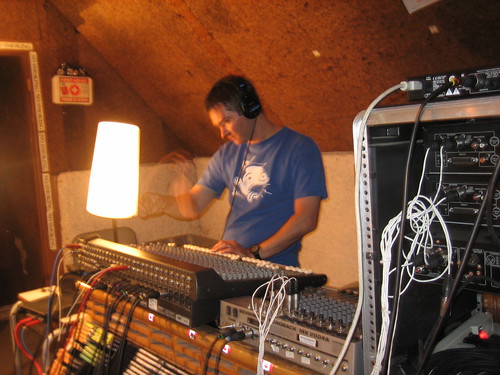Abstract Index Playlist - December 23/09
 Do you remember the middle of the decade when Light In The Attic's "Jamaica To Toronto" series came out? Everyone considered these collections to be a true revelation in the history of Toronto's popular culture. Various media types said the initial comp should be nominated for a Juno? Those same types rhapsodized over the triumphant Harbourfront performances given by the JATDOT crew? Mostly, though, the consensus of my professional peers concluded that such rich cultural history should not be forgotten or swept away.
Do you remember the middle of the decade when Light In The Attic's "Jamaica To Toronto" series came out? Everyone considered these collections to be a true revelation in the history of Toronto's popular culture. Various media types said the initial comp should be nominated for a Juno? Those same types rhapsodized over the triumphant Harbourfront performances given by the JATDOT crew? Mostly, though, the consensus of my professional peers concluded that such rich cultural history should not be forgotten or swept away.You know where I'm going with this.
In 2009, roots reggae in Canada remains a highly popular genre - it's all over university campuses, First Nations reserves and even onstage in luxurious theatres - but few artists benefit. Though there has been steady growth in the number of festivals in Canada which feature reggae, it's still very difficult to tour coast to coast playing reggae (as it is for most non-rock genres, although touring Canada in any capacity is a tough slog).
Compared to the shiny futurism of dancehall which has come on strong crossover-wise in the last five years, roots reggae seems passe to those who aren't already fans. Add to that the increasing backlash (sometimes totally on the money) against waxen-locked white reggae fans, and certain homophobic dancehall artists it seems that roots reggae has been backed into a permanent status of a niche genre, even though as mentioned before, it has only become more popular and entrenched in so many different locales.
That said, the entrepreneurial spirit of roots reggae champions in this country still leaves a lot to be desired. In a nutshell, most advocates of the nearly invisible indigenous roots reggae infrastructure still pray that more mainstream radio play and major label signings will take the music to the next level. Only very recently has social networking entered the picture in terms of connecting the diffuse audiences for the music into something resembling a commercial force.
That's what got to happen - taking the core audience beyond Canada's considerable Jamaican and Caribbean population to find like minded people around the country and the globe, all the while respecting the music's history and culture. This has to give greater impetus to Canadian artists to pursue different career strategies, whether finding new audiences for gigs, or new collaborators for recordings. As we should all know by now, any strategy which hinges on the sale of music to generate revenue/career prospects will not work for any form of music.
One of my primary goals at the Abstract Index is to big up Canada's reggae scene. I don't consistently devote half an hour of air time to any other genre of music. Not only is reggae a considerable musical interest of mine, but campus community radio in Toronto has always been a place to showcase music for cultural reasons, not simply to follow trends or too-easily compiled Soundscan statistics. Given that cultural focus and community organization, one finds amazing stories to go along with the music.
Next year, Willi Williams will be entering his sixth decade of professional music making. He goes back and forth between Toronto and Jamaica, and has produced a wealth of finely crafted, highly individual musical offerings. He's pretty much the dean of Toronto reggae at this point, so it was a welcome event when "Di Real Rock" was released this summer after a gestation of some 11 years. It's not the best reggae album of the year, but it's very solid with a very diverse sound encompassing tracks recorded at Channel One some 30 years ago to more contemporary recordings.
My conversation with Willi - which was a real thrill - was wide-ranging and touched on decades of memories, storied collaborations (Coxsone Dodd, Yabby You etc.) and opinions on the state of the reggae world today. After so many years in the business, his expectations are measured. However, both he and Canadian Reggae World are putting in a great deal of work to support his New Year's Eve show at Habesha.
Though my radio show will always be peripheral to the main thrust of reggae music's activity in Canada, it's a honour to participate in the collective effort of making sure that important artists such as Willi will continue to have access to the media in their continued artistic and commercial struggles. Roots reggae remains strong despite the vicissitudes of popular culture in recognizing the people who keep it going.
Podcast
arbolito - willie colon & hector lavoe (fania)
quindiambo - irakere (egrem)
nana - soumboury jazz (syllart)
lidan misineba - grupo ibimeni (sub rosa)
como un ave - grupo celeste (no label)
transit - darcy james argue secret society (new amsterdam)
first day of school - nojo (no label)
nifac 63 charlie - drumheller (rat drifting)
take me to the mardi gras - bob james (cti)
caves - nosaj thing (brainfeeder)
detroit riot - sonido del principe vs. moodyman (no label)
before old pirates came - willi williams (drum street)
bitty dub - bitty mclean (peckings)
everywhere you go - bim sherman (blood and fire)
wild wind - fat freddy's drop (no label)
big two hundred - playgroup (echo beach)
tribal war - george nooks/prince weedy (vp)
more heartaches version - lizzy (harry j)


0 Comments:
Post a Comment
<< Home